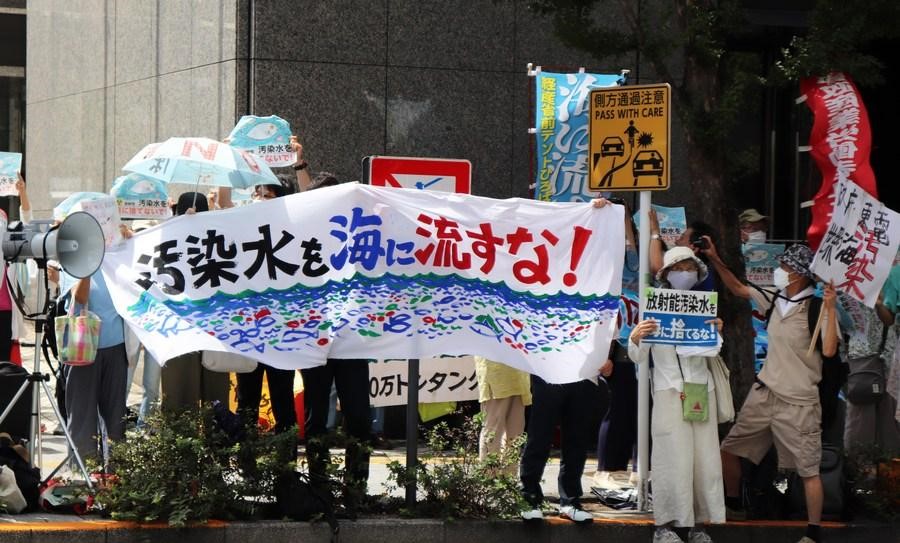Japan started releasing nuclear-contaminated wastewater from the crippled Fukushima Daiichi Nuclear Power Plant into the Pacific Ocean on Thursday, disregarding public concerns and strong opposition from both home and abroad.
The Japanese government and certain organizations claim that the released water is safe, but environmental activists argue that all the possible impacts have not been studied and the wastewater disposal will take decades to complete.
Flip-flopping
During a meeting with Prime Minister Fumio Kishida, Japan's National Federation of Fisheries Cooperative Associations (JF Zengyoren) on Monday lodged a serious protest to the government's decision and action to release Fukushima nuclear-contaminated wastewater into the ocean.
Masanobu Sakamoto, head of JF Zengyoren, said the group strongly opposes the ocean release project, which would ruin the reputation of seafood from Fukushima and nearby areas.
The Fukushima Daiichi plant was destroyed in March 2011 after a massive 9.0 magnitude earthquake generated powerful tsunami waves that caused the meltdowns of three of its nuclear reactors -- one of the worst nuclear disasters in history.
Japan's fisheries industry, hit with years of reputational damage from radiation fears, has long opposed the plan. People fear it would lead to a sharp drop in sales, including export restrictions to major markets.
In 2015, the plant operator Tokyo Electric Power Company (TEPCO) and the Japanese government swore in writing to organizations such as JF Zengyoren that they would not discharge the nuclear effluent into the ocean until they had the understanding of local fishermen and other stake-holders.
However, six years later, the Japanese government unilaterally decided to discharge millions of tons of nuclear-contaminated water into the sea in 2023 after "treatment and dilution," and the discharge process may last 30 to 40 years.
In the absence of sufficient scientific evidence, and transparency of related information, the irresponsible discharge of nuclear-contaminated wastewater will inevitably lead to serious consequences, said experts.
Broad condemnation
"China firmly opposes and strongly condemns it. We have made serious demarches to Japan and asked it to stop this wrongdoing," a Chinese Foreign Ministry spokesperson said in a statement on Thursday.
Noting that the disposal of the Fukushima nuclear-contaminated water is a major issue about nuclear safety, the spokesperson said its impact goes beyond Japan's borders, and the issue is by no means a private matter for Japan.
China also suspended imports of all seafood products from Japan on Thursday due to concerns over the risk of radiation contamination.
Shortly after TEPCO began discharging the contaminated water into the sea, South Korean Prime Minister Han Duck-soo said in a nationally televised address that the South Korean government will strictly maintain import restrictions on Japan's fishery products.
Protesters broke into the Japanese embassy in Seoul on Thursday, after unfurling banners to protest Tokyo's release of wastewater. "The sea is not Japan's trash bin," read one of the banners. "Stop releasing contaminated water at once."
The Japanese government's reckless move to release the radioactive wastewater also sparked waves of anger among local people, especially Japanese fishermen and business owners.
Despite the scorching heat, hundreds of Japanese from across the country gathered in front of the TEPCO headquarters in central Tokyo on Thursday morning, demanding the Japanese government and TEPCO stop the release.
Haruo Ono, a 71-year-old fisherman in Shinchi Town, Fukushima Prefecture, told Xinhua on Tuesday that "for us, the ocean discharge is a matter of survival."
"Does Fumio Kishida, as the prime minister of Japan, have the right to pollute our workplaces?" the man asked.
Long-lasting harm
Critics say a lack of long-term data means that it is impossible to justify the tritium left in the contaminated water after processing poses no threat to human health or the marine environment.
Although about 200 tonnes of treated wastewater were released on the first day, noted experts Thursday, however starting Friday, the pour volume will increase to 7,800 tonnes over 17 days.
More than 1.3 million tonnes of wastewater -- enough to fill more than 500 Olympic-size swimming pools -- currently contained in numerous water storage tanks at the TEPCO facility, are set to be poured into the ocean, which could take up to 40 years to complete.
By dumping the nuclear-contaminated water into the ocean, Japan is spreading huge risks to the rest of the world, and openly passing long-term harm onto future generations of humanity.
